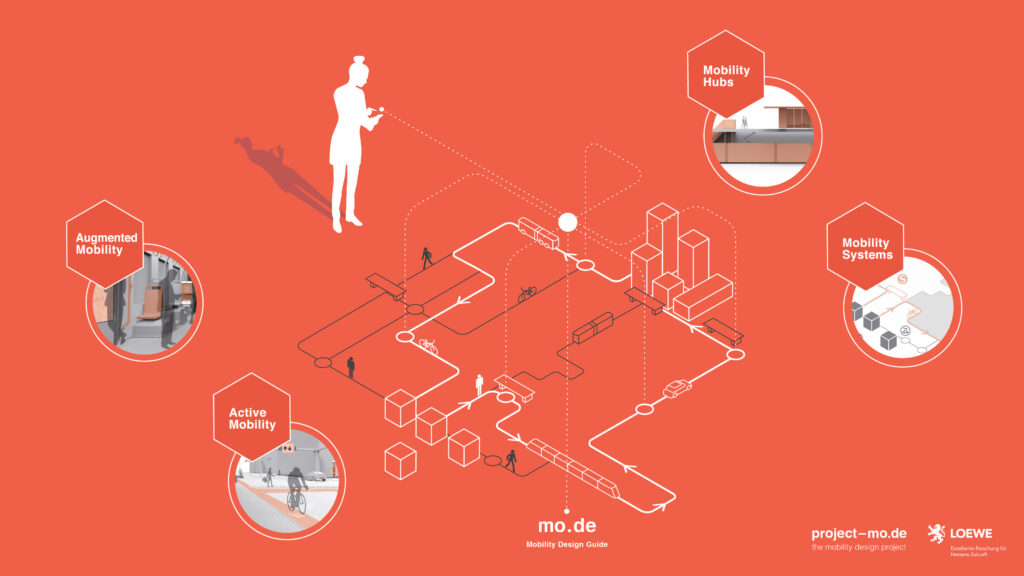
How can the needs of various users be integrated into the design of new, sustainable mobility services?
This is the question the LOEWE research cluster “Infrastructure – Design – Society” addressed by conducting interdisciplinary research into concepts for planning and designing mobility spaces, infrastructure, processes and products. The focus was on personal mobility within the respective transportation system and its infrastructure. The needs of various users were integrated into the design of mobility services and on this basis specific design methods evolved. Design research concentrated here mainly on the emotional factors involved when people avail themselves of services – with the aim being to favorably influence user attitudes and behavior. Regional stakeholders and users were actively consulted in this process. Finally, design guidelines were developed that focus on the overall structure of the mobility system rather than individual products and services in order to promote sustainable infrastructures and multimodal mobility chains.
In the LOEWE priority, researchers from five disciplines have joined forces to investigate the requirements for the design of this new mobility for the Rhine-Main conurbation: Design at the Offenbach University of Art and Design, Transportation research at the Frankfurt University of Applied Sciences, Social Science Mobility Research at the Goethe University Frankfurt, and Urban Planning and Multimedia Communication at the Darmstadt University of Technology. Central to the joint work were, among other things, four “test situations”, on the basis of which scientific analyses, drafts and recommendations were developed on various topics: on the redesign of the Offenbach-Marktplatz mobility hub, on the expansion of cycle lanes in Offenbach, on the one-year closure of Frankfurt’s Main Quay, and on the development of a mobile app to playfully motivate mobility behaviour. The research of the LOEWE focus was brought together in a digital Mobility Design Guide. This interactive guide provides actors in politics, urban and transport planning, but also architecture and design with inspiration, models and research bases that support the planning and realisation of future-oriented mobility concepts.
For the institutions involved, the LOEWE focus has contributed significantly to networking in the region: with universities, but also with municipalities, transport companies or start-ups in the field of mobility. Research on mobility design, sustainable mobility and urban design has been significantly strengthened at the individual locations – this is reflected not least in the establishment of new professorships (Urban Design, Cycling, Urban Planning) and a degree course (Sustainable Mobility) at the universities involved.
The Offenbach Institute for Mobility Design was established at the Offenbach University of Art and Design as a result of the LOEWE focus.
Type of Project • Research project
Lead • HfG: Prof. Peter Eckart, Prof. Dr. Kai Vöckler, Prof. Andrea Krajewski (Hochschule Darmstadt)
Team • HfG: Dipl.-Des. Julian Schwarze, Dipl.-Des. Sabine Reitmaier, Dipl.-Des. Anna-Lena Moeckl, Dipl.-Des. Annalena Kluge, Dr. Karin Gottschalk, Marlit Budis M. Phil.
Status • completed
Duration • 01/2018 – 06/2022
Cooperation • Prof. Dr.-Ing. Petra K. Schäfer (Frankfurt University of Applied Sciences), Prof. Dr. Martin Lanzendorf (Goethe University Frankfurt), Prof. Dr.-Ing. Martin Knöll, Prof. Dr. Ralf Steinmetz, PD Dr. Stefan Göbel (all at Technical University Darmstadt)
Additional cooperation partners • House of Logistics and Mobility (HOLM) GmbH, Rhein-Main-Verkehrsverbund (RMV) GmbH, ivm GmbH (Integriertes Verkehrs- und Mobilitätsmanagement Region Frankfurt RheinMain)
Funding • Hessian Ministry of Higher Education, Research, Science and the Arts (LOEWE program)